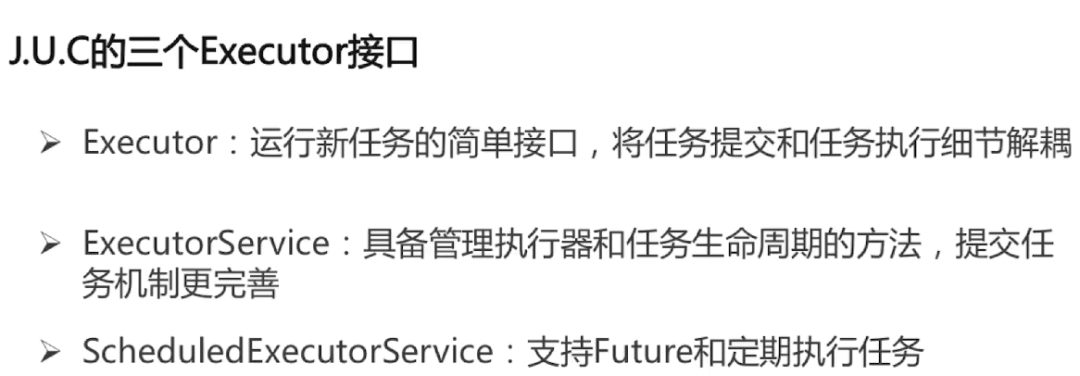基础线程机制
Executor
管理多个异步任务的执行,而无需程序员显式地管理线程的生命周期。这里的异步是指多个任务的执行互不干扰,不需要进行同步操作。
Daemon
守护线程是程序运行时在后台提供服务的线程,不属于程序中不可或缺的部分。
当所有非守护线程结束时,程序也就终止,同时会杀死所有守护线程。main() 属于非守护线程。
使用 setDaemon() 方法将一个线程设置为守护线程。
public static void main(String[] args) {Thread thread = new Thread(new MyRunnable());thread.setDaemon(true);}
sleep()
Thread.sleep(millisec) 方法会休眠当前正在执行的线程,millisec 单位为毫秒。sleep() 可能会抛出 InterruptedException,因为异常不能跨线程传播回 main() 中,因此必须在本地进行处理。线程中抛出的其它异常也同样需要在本地进行处理。
public void run() {try {Thread.sleep(3000);} catch (InterruptedException e) {e.printStackTrace();}}
yield()
对静态方法 Thread.yield() 的调用声明了当前线程已经完成了生命周期中最重要的部分,可以切换给其它线程来执行。该方法只是对线程调度器的一个建议,而且也只是建议具有相同优先级的其它线程可以运行。
public void run() {Thread.yield();}
中断
一个线程执行完毕之后会自动结束,如果在运行过程中发生异常也会提前结束。
InterruptedException
通过调用一个线程的 interrupt() 来中断该线程,如果该线程处于阻塞、限期等待或者无限期等待状态,那么就会抛出 InterruptedException,从而提前结束该线程。但是不能中断 I/O 阻塞和 synchronized 锁阻塞。
对于以下代码,在 main() 中启动一个线程之后再中断它,由于线程中调用了 Thread.sleep() 方法,因此会抛出一个 InterruptedException,从而提前结束线程,不执行之后的语句。
public class InterruptExample {private static class MyThread1 extends Thread {@Overridepublic void run() {try{Thread.sleep(2000);System.out.println("Thread run");} catch (InterruptedException e) {e.printStackTrace();}}}}public static void main(String[] args) throws InterruptedException {Thread thread1 = new MyThread1();thread1.start();thread1.interrupt();System.out.println("Main run");}//结果Main runjava.lang.InterruptedException: sleep interruptedat java.lang.Thread.sleep(Native Method)at InterruptExample.lambda$main$0(InterruptExample.java:5)at InterruptExample$$Lambda$1/713338599.run(Unknown Source)at java.lang.Thread.run(Thread.java:745)
interrupted()
如果一个线程的 run() 方法执行一个无限循环,并且没有执行 sleep() 等会抛出 InterruptedException 的操作,那么调用线程的 interrupt() 方法就无法使线程提前结束。
但是调用 interrupt() 方法会设置线程的中断标记,此时调用 interrupted() 方法会返回 true。因此可以在循环体中使用 interrupted() 方法来判断线程是否处于中断状态,从而提前结束线程。
public class InterruptExample {private static class MyThread2 extends Thread {@Overridepublic void run() {while (!interrupted()) {// ..}System.out.println("Thread end");}}}public static void main(String[] args) throws InterruptedException {Thread thread2 = new MyThread2();thread2.start();thread2.interrupt();}//结果Thread end
Executor 的中断操作
调用 Executor 的 shutdown() 方法会等待线程都执行完毕之后再关闭,但是如果调用的是 shutdownNow() 方法,则相当于调用每个线程的 interrupt() 方法。
以下使用 Lambda 创建线程,相当于创建了一个匿名内部线程。
public static void main(String[] args) {ExecutorService executorService = Executors.newCachedThreadPool();executorService.execute(() -> {try {Thread.sleep(2000);System.out.println("Thread run");} catch (InterruptedException e) {e.printStackTrace();}});executorService.shutdownNow();System.out.println("Main run");}//结果Main runjava.lang.InterruptedException: sleep interruptedat java.lang.Thread.sleep(Native Method)at ExecutorInterruptExample.lambda$main$0(ExecutorInterruptExample.java:9)at ExecutorInterruptExample$$Lambda$1/1160460865.run(Unknown Source)at java.util.concurrent.ThreadPoolExecutor.runWorker(ThreadPoolExecutor.java:1142)at java.util.concurrent.ThreadPoolExecutor$Worker.run(ThreadPoolExecutor.java:617)at java.lang.Thread.run(Thread.java:745)
如果只想中断 Executor 中的一个线程,可以通过使用 submit() 方法来提交一个线程,它会返回一个 Future<?> 对象,通过调用该对象的 cancel(true) 方法就可以中断线程。
Future<?> future = executorService.submit(() -> {// ..});future.cancel(true);

